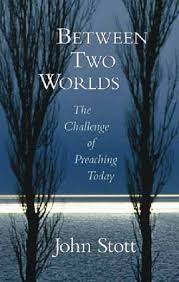
John Stott’s book Between Two Worlds contains a wealth of wisdom from across centuries of preaching, marinated in decades of Stott’s personal pastoral ministry, and written through the pen of a gifted communicator.
Stott himself points out that there are hundreds of books on preaching, so why write another one? What’s unique about his book Stott writes, is that he blends together history of preaching, issues facing preachers today and practical tips in preaching.[1] Most books focus on just one of those areas. The reason the book is called Between Two Worlds, is because Stott likens preachers to bridge builders who try to link the biblical world with today’s world, interpreting scripture in its historical context, but making it relevant to today’s.[2]
Critique
One of the only critiques of the book was with Stott’s argument regarding the use of technology in preaching. I fully agreed with Stott on his thoughts about the effects of technology on preaching and society in general. However, I was surprised by some of Stott’s suggestions. After arguing against over-exposure to technology he then advocates for implementing it into sermons (i.e. film slides, video, projector, pictures, etc.). He writes, “Whatever is dull, drab, dowdy, slow or monotonous cannot compete in the televised age. Television challenges preachers to make our presentation of the truth attractive through variety, colour, illustration, humour and fast-flowing movement.”[3]
I’m not advocating for a monotonous and dry reading of a manuscript devoid of all elocution and illustration. But neither do I think we should turn Sunday morning worship into the fast-paced, frenzied, seamless, pauseless, entertainment experience that describes every gameshow on television. Stott believes preaching must resemble culture to win the culture. I agree that we should preachers must knowledgeable of the culture in order to effectively communicate with people. However, the presence of God should cause reverent contemplation. I fear that following Stott too far here could make a worship service into a seamless entertainment experience that causes people to become sedated by the smooth transitions and fail to realize they are worshiping God.
Positive & Applications
To start, Stott recommends reading widely to stay culturally informed. One suggestion he made was to read a weekly newspaper thoroughly, rather than giving a daily paper a cursory read.
Second, I very much enjoyed Stott’s section on making time to read. He urges the pastor to read as much as possible and argues that it is vital for a healthy pastoral ministry. He writes, “the minimum would amount to this: every day at least one hour; every week one morning, afternoon or evening; every month a full day; every year a week.”[4] This was a very helpful breakdown and one that seemed attainable.
Third, he recommends not drawing too much attention to your sermon outline. Stott argues that the structure of the sermon is meant to be the skeleton supporting the body; you don’t need to see it. This was helpful though need not be followed by every preacher.
Fourth, Stott shares a quote from Mark Twain when he writes, “The difference between the right word and the nearly right is the difference between lightning and the lightning bug.”[5] The right words are important in communication. A word or a chain of words can paint a picture, illicit emotions or stick in a listener’s mind. Good preachers do this well.
Stott warns against the spiritually inadequate diet of very short sermons,[6] as well as the importance of practicing what we preach. His words are striking: “Unless you preach everywhere you go, there is no use to go anywhere to preach.”
This book by Stott was a wonderful read and one I’d recommend to every person hoping to grow in their preaching.
[1] John Stott, Between Two Worlds: The Challenge of Preaching Today, Reprint edition (Grand Rapids, Mich: Eerdmans, 1982). 9.
[2] Stott. 10, 138.
[3] Stott. 76.
[4] Stott. 204.
[5] Stott. 234.
[6] Stott. 294.

Mike McGregor
Mike McGregor (MDiv, Reformed Theological Seminary) is Director of College Ministry at First Baptist Church in Durham, N.C. You can follow him on Twitter at @m5mcgregor.




